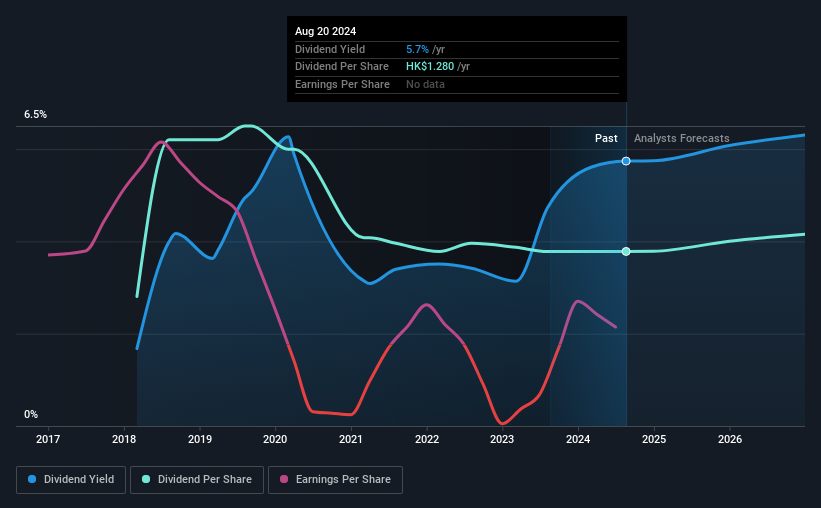It looks like Wharf Real Estate Investment Company Limited (HKG:1997) is about to go ex-dividend in the next 2 days. The ex-dividend date occurs one day before the record date which is the day on which shareholders need to be on the company’s books in order to receive a dividend. The ex-dividend date is an important date to be aware of as any purchase of the stock made on or after this date might mean a late settlement that doesn’t show on the record date. Thus, you can purchase Wharf Real Estate Investment’s shares before the 23rd of August in order to receive the dividend, which the company will pay on the 10th of September.
The company’s upcoming dividend is HK$0.64 a share, following on from the last 12 months, when the company distributed a total of HK$1.28 per share to shareholders. Calculating the last year’s worth of payments shows that Wharf Real Estate Investment has a trailing yield of 5.7% on the current share price of HK$22.30. Dividends are a major contributor to investment returns for long term holders, but only if the dividend continues to be paid. That’s why we should always check whether the dividend payments appear sustainable, and if the company is growing.
View our latest analysis for Wharf Real Estate Investment
Dividends are typically paid out of company income, so if a company pays out more than it earned, its dividend is usually at a higher risk of being cut. Wharf Real Estate Investment distributed an unsustainably high 199% of its profit as dividends to shareholders last year. Without more sustainable payment behaviour, the dividend looks precarious. Yet cash flow is typically more important than profit for assessing dividend sustainability, so we should always check if the company generated enough cash to afford its dividend. Dividends consumed 66% of the company’s free cash flow last year, which is within a normal range for most dividend-paying organisations.
It’s good to see that while Wharf Real Estate Investment’s dividends were not covered by profits, at least they are affordable from a cash perspective. Still, if the company repeatedly paid a dividend greater than its profits, we’d be concerned. Very few companies are able to sustainably pay dividends larger than their reported earnings.
Click here to see the company’s payout ratio, plus analyst estimates of its future dividends.

Have Earnings And Dividends Been Growing?
When earnings decline, dividend companies become much harder to analyse and own safely. If business enters a downturn and the dividend is cut, the company could see its value fall precipitously. Wharf Real Estate Investment’s earnings have collapsed faster than Wile E Coyote’s schemes to trap the Road Runner; down a tremendous 36% a year over the past five years.
The main way most investors will assess a company’s dividend prospects is by checking the historical rate of dividend growth. In the last six years, Wharf Real Estate Investment has lifted its dividend by approximately 5.1% a year on average. The only way to pay higher dividends when earnings are shrinking is either to pay out a larger percentage of profits, spend cash from the balance sheet, or borrow the money. Wharf Real Estate Investment is already paying out a high percentage of its income, so without earnings growth, we’re doubtful of whether this dividend will grow much in the future.
The Bottom Line
Has Wharf Real Estate Investment got what it takes to maintain its dividend payments? Earnings per share have been shrinking in recent times. Additionally, Wharf Real Estate Investment is paying out quite a high percentage of its earnings, and more than half its cash flow, so it’s hard to evaluate whether the company is reinvesting enough in its business to improve its situation. It’s not that we think Wharf Real Estate Investment is a bad company, but these characteristics don’t generally lead to outstanding dividend performance.
Having said that, if you’re looking at this stock without much concern for the dividend, you should still be familiar of the risks involved with Wharf Real Estate Investment. Every company has risks, and we’ve spotted 2 warning signs for Wharf Real Estate Investment you should know about.
A common investing mistake is buying the first interesting stock you see. Here you can find a full list of high-yield dividend stocks.
Valuation is complex, but we’re here to simplify it.
Discover if Wharf Real Estate Investment might be undervalued or overvalued with our detailed analysis, featuring fair value estimates, potential risks, dividends, insider trades, and its financial condition.
Have feedback on this article? Concerned about the content? Get in touch with us directly. Alternatively, email editorial-team (at) simplywallst.com.
This article by Simply Wall St is general in nature. We provide commentary based on historical data and analyst forecasts only using an unbiased methodology and our articles are not intended to be financial advice. It does not constitute a recommendation to buy or sell any stock, and does not take account of your objectives, or your financial situation. We aim to bring you long-term focused analysis driven by fundamental data. Note that our analysis may not factor in the latest price-sensitive company announcements or qualitative material. Simply Wall St has no position in any stocks mentioned.

